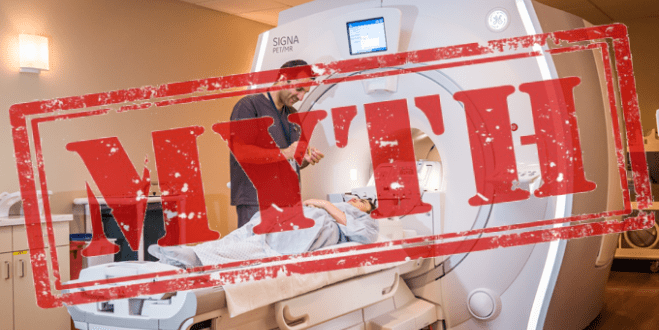
This is the final part in our 5 Part series “Myths You Were Told About Your Pain”
Pain Myth #1: “Rest Will Fix Your Problem”
Pain Myth #2: “Just Stretch It”
Pain Myth #3: “A Cortisone Injection is the Answer To Your Problem”
Pain Myth #4: “It’s Because of Your Age”
This might sound surprising to a lot of people, but MRIs are very often not needed to successfully treat your pain/problem. Being aware of this can save you valuable time and money as you try to find a solution to your problem.
The main reason for this is because there is a high percentage of “abnormal” findings (i.e. disc bulges/herniations, partial tears, arthritis, etc.) in people who aren’t experiencing any pain. To put it another way, MRI results can be very misleading.
Take a look at some stats for MRIs taken on HEALTHY, PAIN-FREE PEOPLE:
- 33% of ALL people had a rotator cuff tear
- 60% of people had a disc abnormality in their low back
- 80% of people had a disc bulge in their neck
- 75% of baseball pitchers had rotator cuff damage
- 65% had cartilage damage in their knee
- 25% had a meniscal tear in their knee
Look at all those “problems” that aren’t causing ANY pain!
If you already had an MRI, what these numbers should make you (and your doctor) ask is “Were those ‘abnormal’ findings there before I had my pain?”
And it takes a thorough assessment coupled with a deep discussion about your problem to figure out the answer to that question.
Need Help? Inquire About Cost & Availability
From a physical therapist’s perspective, we don’t create a treatment plan based upon your MRI findings – otherwise we would just do the same thing for everybody who has a herniated disc, arthritis, etc. We evaluate each patient individually and address the impairments we find. As I tell my patients:
“WE DON’T TREAT SCANS, WE TREAT PEOPLE.”
How about another scary stat – a scientific study found that for low back pain 35% of all MRIs were UNNECESSARY. And I actually think that that number is lower than it really should be.
Ironically, an MRI Can Actually Make You Feel Worse
This one probably has you scratching your head and saying “what’s the harm in getting an MRI!?” And I completely understand that thought, so let me explain.
The potential harm that can come from an MRI is that it can negatively affect your outlook/prognosis and lead you down a more invasive treatment path (injections, surgery, etc) because it’s “treating” the MRI and not you. This is especially true if you got an MRI because of back or neck pain.
Many people feel “labeled” after getting an MRI, which can increase their anxiety about their pain and/or cause a heightened sense of concern. This can lead them to seek more and more medical care (testing, different doctors, etc).
And just so I’m clear, MRIs don’t cause any physical harm, but the results can indirectly lead to people feeling worse.
Insurance Companies Are Aware of This Myth Too
Health insurance companies are also aware that MRIs are overused and, many times, unnecessary. It’s not totally surprising that they realized this because it saves them money as MRIs are rather expensive at ~$2000 a pop (more and more of which you are responsible for).
This is why they deny authorization for some MRI requests – they are expensive, tend to lead to more expensive tests, and don’t necessary lead to improved care or better outcome.
Why pay money for something that may very well be unnecessary and potentially cause you to have less favorable results!?
Next Time You Are Told You Need an MRI…
So you’re sitting in the doctor’s office discussing your problem and the doctor says it sounds like [insert diagnosis here] and that you need to get an MRI.
The next thing you should ask is “Why are you suggesting an MRI and how are the MRI results going to change my treatment plan?” Because all too often, the answer is…it won’t.
Remember, a good physical therapist does not develop a treatment plan based on your MRI results. They’ll create a treatment based on the combination of you (your problem, complaints, goals, etc) and their evaluation.
A good therapist can easily figure out “what” hurts without an MRI, but is actually more concerned about the “why”….why it hurts and how to fix the problem (not just symptomatically treat the “what”).
So, before you go get that MRI, ask your doctor why they are ordering it and how it will affect your treatment plan. It could save you valuable time and money AND lead to a quicker/better outcome!
Kim Gladfelter, MPT, OCS, FAAOMPT Kim Gladfelter is a physical therapist, Pilates instructor, educator, author, and co-founder of PhysioFit Physical Therapy & Wellness. She is known as a keen, well-rounded expert of healing through movement and women’s health specialist in the Silicon Valley area. Kim has helped men and women of all ages to stay active and feel their best. She also writes about managing pain in her health columns, blogs and the local Los Altos Town Crier newspaper as well as reaches out to the local community, support groups, schools, libraries, and sports centers to advise and educate on body awareness and therapeutic exercise. ABOUT THE AUTHOR
ABOUT THE AUTHOR
Women's Health Physical Therapy Specialist at PhysioFit Physical Therapy & Wellness

 Los Altos, CA
Los Altos, CA
